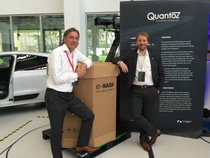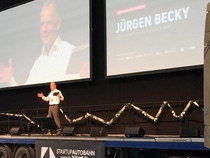Media
“Steve Benz” wanted – BASF works with digital start-ups with visionary ideas for the mobility industry
- BASF participates in innovation platform STARTUP AUTOBAHN
- Chemistry as enabler for future mobility solutions: from mobile gas station to smart pallets
Ludwigshafen, Germany, July 25, 2017 – Why drive to the gas station when the gas station could come to you? That’s what the creative minds behind start-up POMP asked themselves. Their vision: a car that automatically informs its owner about a low fuel tank and gets refilled on-site through mobile fuel service vehicles. With support of the fuel additives experts from BASF, this mobile gas station concept is now being developed further.
This and other innovative ideas around mobility and digitalization were presented at the EXPO Day of start-up accelerator STARTUP AUTOBAHN in Stuttgart on July 25. Alongside other corporates, like Daimler, Porsche, and Hewlett Packard Enterprise / DXC Technology, BASF has been partnering and mentoring selected start-ups in pilot projects in the areas of blockchain, sensor technology, augmented reality, future manufacturing, and product simulation.
“We believe that big ideas start small. That’s why we work with young entrepreneurs who have the potential to change the future of mobility and production,” says Jürgen Becky, Senior Vice President Performance Materials at BASF. “It’s at STARTUP AUTOBAHN, where – figuratively speaking – the ingenuity of Carl Benz or Fritz Haber meets the visionary ideas of Steve Jobs. It is this enthusiasm for new things and entrepreneurial spirit that we want to foster within BASF to strengthen our own innovation power and competitiveness.”
As the leading chemical supplier to the automotive industry, BASF is a strong innovation partner and enabler for the mobility solutions of tomorrow. As an example, BASF’s plastics experts contribute their material competence and processing know-how to a pilot project with start-up KREATIZE. Its digital platform facilitates the direct exchange between Original Equipment Manufacturer (OEM) and supplier. Carmakers can upload CAD files of their automotive parts onto the platform. Thanks to a matching algorithm they can find the best possible material and production process for it, order right away, and pay directly online.
Another pilot project relates to supply chains: How do you recognize that a delivery is incomplete or damaged, even before you receive it? The start-up Quantoz, together with BASF and start-up Ahrma, found a smart answer to this question: an intelligent pallet that not only informs about its position and movement, but also its loading status as well as a possible impact or drop. Thus, missing or damaged parts could be automatically re-ordered. By using Quantoz’ blockchain technology, the security and trust in the data integrity could be additionally increased. This combination provides an outlook for a secure and transparent material and data flow in the future.
But STARTUP AUTOBAHN is not BASF’s only initiative around digital innovation and start-ups. With AgroStart, for instance, BASF supports digital start-up companies in the agricultural sector in South America. BASF is also pursuing innovative solutions within its nutrition and health business in partnership with RocketSpace and their TERRA start-up accelerator program. Furthermore, BASF participates in the “Digital Hub Ludwigshafen/Mannheim” located in Ludwigshafen, Germany, which is part of an initiative developed by the German Ministry for Economic Affairs and Energy. The hub aims to strengthen the start-up activities in the Rhine-Neckar metropolitan region, to raise international awareness for digital chemistry and digital health, and to collaborate with scientific partners from all around the world on these topics. In addition, BASF wants to attract digital talents, both for the company and the region.
What is blockchain?
Blockchain is a database technology designed to make digital transactions faster, cheaper, safer, and more transparent. Applications include financial services, accounting, and the Internet of Things. Blockchain is a kind of ledger with entries recording every transaction that has ever taken place. The difference is that the database is decentralized and shared across thousands of computers, including ordinary home PCs. Anyone can join the blockchain network and view any transaction at any time. Although many practical applications of blockchain are still in their infancy, the list of potential uses is long and includes land registry entries, certificates of authenticity, and supply chain checks.
About BASF and the automotive industry
The automotive industry is one of BASF’s key customer industries. In 2016, BASF’s automotive driven sales totaled €10 billion – representing approximately 17 percent of BASF Group’s sales. BASF supplies and develops functional materials and solutions that enable vehicles to be built more efficiently and have a lower environmental impact, whatever powertrain technology they use. BASF’s product range includes for example plastics, coatings, catalysts, automotive fluids as well as battery materials. With such an extensive range of products, BASF is the world’s leading chemical supplier to the automotive industry. BASF cooperates closely with customers all over the world through a network embracing Europe, Asia-Pacific, North and South America as well as Africa. Further information on BASF’s solutions for the automotive industry is available on the internet at automotive.basf.com.
About BASF
At BASF, we create chemistry for a sustainable future. We combine economic success with environmental protection and social responsibility. The approximately 114,000 employees in the BASF Group work on contributing to the success of our customers in nearly all sectors and almost every country in the world. Our portfolio is organized into five segments: Chemicals, Performance Products, Functional Materials & Solutions, Agricultural Solutions and Oil & Gas. BASF generated sales of about €58 billion in 2016. BASF shares are traded on the stock exchanges in Frankfurt (BAS), London (BFA) and Zurich (BAS). Further information at www.basf.com.
P-17-277


